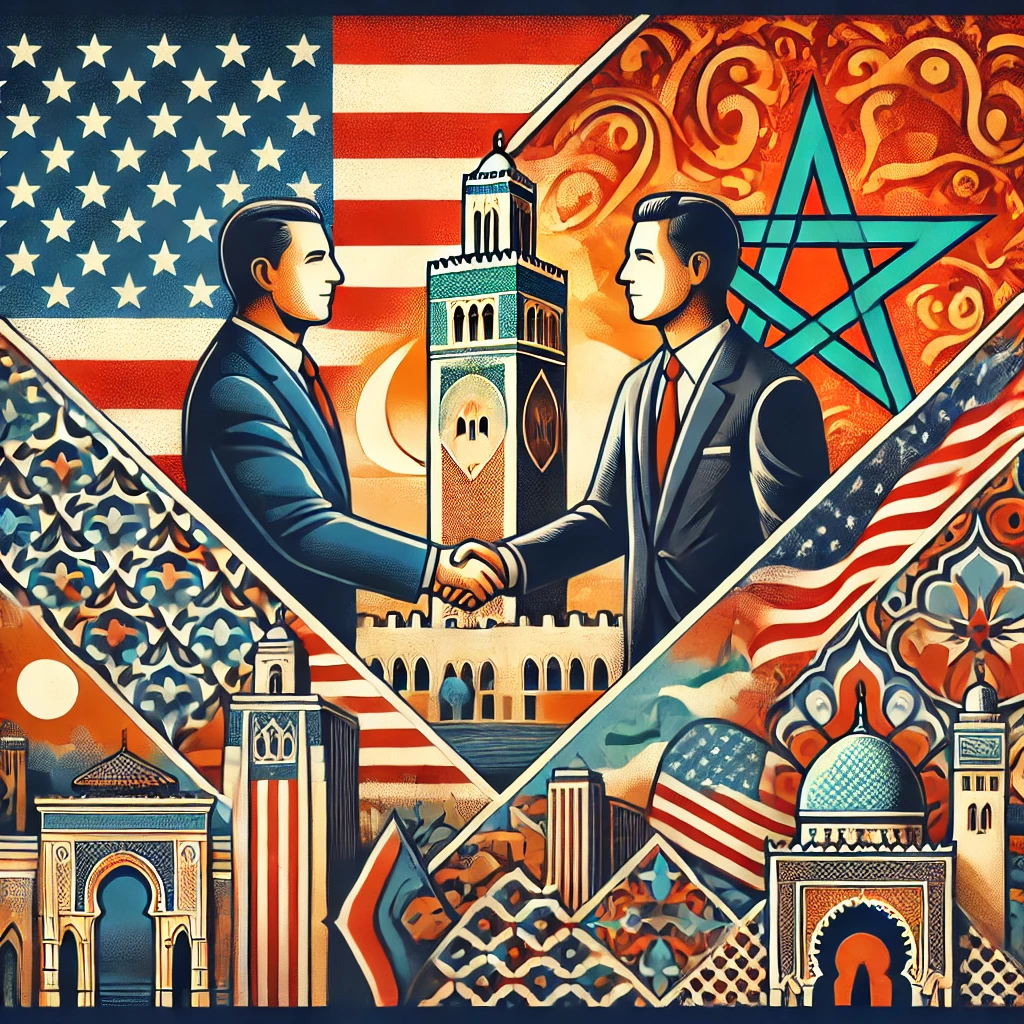, security, and cultural U.S.-Morocco relations date back to 1777, when Morocco became the first to recognize the United States as an independent nation. Since then, their relationship has grown significantly, covering diplomacy, trade, security, and culture. This article explores the depth of the U.S.-Morocco partnership and its importance today.
Diplomatic Ties and Shared Goals
A Historic Alliance Since the 18th Century
Discuss Morocco’s early recognition of American independence in 1777 and the 1786 Treaty of Peace and Friendship, which stands as one of the most extended unbroken treaties in U.S. history. Morocco’s Strategic Role in North Africa.
Highlight Morocco’s significance as a regional ally, contributing to stability in North Africa and supporting U.S. diplomatic goals on global platforms.
Trade and Economic Growth
The U.S.-Morocco Free Trade Agreement
The 2004 Free Trade Agreement between the nations established regional trade strategic partnership as it strengthened their trading relationships.
Investment Opportunities Across Sectors
American investments in Morocco now target multiple sectors including agriculture together with energy technology and manufacturing as well as the fundamental field of agriculture.
Security Cooperation for Regional Stability
HMilitary and Counterterrorism Collaboration
Explore the partnership in military training and intelligence sharing, including joint exercises like the annual African Lion drills, which support security in North Africa.
Combating Global Threats Together
Describe how U.S.-Morocco relations aid in counterterrorism efforts, making the region safer and protecting global interests.
Cultural Exchange and Education
Building Bridges Through Education
Discuss American programs, such as Fulbright, which foster cultural and educational exchanges, and Morocco’s influence on American arts and cuisine.
The Spread of Moroccan Culture in the U.S.
Americans familiarize themselves with Moroccan music and gastronomy combined with cultural practices which promote bilateral understanding.
Conclusion
The import of U.S.-Moroccan diplomatic cooperation becomes essential because it serves peacebuilding efforts and facilitates security alongside economic alliances and multicultural exchanges. The partnership illustrates how matching aspirations between nations forms permanent national alliances through collaborative strategies.exchange. This partnership demonstrates how cooperation and shared goals can build lasting bonds between nations.
External Sources for Further Reading
- U.S.-Morocco Relations Overview – U.S. Department of State
- Free Trade Agreement Insights – Office of the U.S. Trade Representative
- Security and Defense Cooperation – Africa Center for Strategic Studies
Full Article
U.S.-Morocco Relations: A Partnership Across Diplomacy, Trade, and Culture
Introduction
U.S.-Morocco relations have been a cornerstone of international cooperation since 1777 when Morocco became the first country to recognize the independence of the United States. From that historic moment, a unique partnership emerged, encompassing diplomacy, trade, security, and cultural exchange. Today, Morocco remains a strategic ally in North Africa, supporting American interests across various sectors. As we explore the many facets of U.S.-Morocco relations, it becomes clear that this partnership exemplifies the benefits of cross-cultural cooperation and mutual support.
Diplomatic Ties and Shared Goals
A Historic Alliance Since the 18th Century
The history of U.S.-Morocco relations began with Morocco’s early recognition of American independence. In 1786, both nations signed the Treaty of Peace and Friendship, one of the oldest and longest-standing treaties in U.S. history. This foundational document symbolizes the mutual respect and friendship between Morocco and the United States. Today, Morocco continues to play a significant role in North Africa, serving as a bridge between the West and the Arab world and a supporter of U.S. diplomatic initiatives on the international stage.
Morocco’s Strategic Role in North Africa
As a stable and influential nation in North Africa, Morocco is crucial to regional stability. The U.S. and Morocco share common goals in promoting peace, development, and security in North Africa and the broader Middle East. Morocco’s diplomatic efforts align with American policies in the region, contributing to a stable environment that benefits both nations.
Trade and Economic Growth
The U.S.-Morocco Free Trade Agreement
The 2004 U.S.-Morocco Free Trade Agreement (FTA) marked a milestone in economic cooperation. This agreement facilitated easier trade and investment between the two countries, creating new opportunities for growth. It covers key sectors, including agriculture, services, and manufacturing, and makes Morocco an attractive market for American businesses. Since the FTA, trade between the two nations has increased significantly, benefiting both economies.
Investment Opportunities Across Sectors
U.S.-Morocco relations in trade are supported by Morocco’s favorable business climate and its strategic location as a gateway to African and European markets. Sectors such as renewable energy, automotive manufacturing, and technology have attracted considerable American investments. Through this partnership, American companies gain access to Morocco’s growing economy, while Morocco benefits from increased economic development.
Security Cooperation for Regional Stability
Military and Counterterrorism Collaboration
U.S.-Morocco relations have long included close security and military cooperation. Morocco participates in the annual African Lion military exercises, the largest joint military training operation in Africa, which strengthens regional security and enhances the capabilities of both nations’ armed forces. This collaboration underscores Morocco’s commitment to supporting U.S. security interests and promoting stability in North Africa.
Combating Global Threats Together
The partnership between Morocco and the U.S. extends to intelligence sharing and counterterrorism efforts. Morocco plays a key role in combating extremist threats, working with the United States to prevent terrorism. This cooperation not only makes North Africa safer but also contributes to global security, demonstrating the importance of U.S.-Morocco relations in maintaining peace worldwide.
Cultural Exchange and Education
Building Bridges Through Education
Educational and cultural programs are an integral part of U.S.-Morocco relations. The Fulbright Program and other initiatives support exchanges that allow students and professionals from both countries to learn from one another. These programs foster mutual understanding and help American participants appreciate Morocco’s rich cultural heritage, while Moroccan participants gain insights into American society.
The Spread of Moroccan Culture in the U.S.
Moroccan music, food, and art have captivated American audiences, making Moroccan culture increasingly popular in the United States. Events such as Moroccan art exhibitions and food festivals introduce Americans to the beauty and diversity of Moroccan traditions. Through these exchanges, U.S.-Morocco relations are strengthened on a personal level, enhancing the relationship between the two nations.
Conclusion
The unique and enduring U.S.-Morocco relations showcase the power of cross-cultural cooperation. From diplomacy to trade, security to cultural exchange, Morocco and the United States share a partnership that benefits both nations. Morocco’s role as a strategic ally, economic partner, and cultural bridge emphasizes the importance of their relationship, which continues to evolve and flourish. As Morocco and the U.S. move forward, this partnership serves as a testament to the benefits of collaboration, shared goals, and a commitment to mutual growth.
External Sources for Further Reading
- U.S.-Morocco Relations Overview – U.S. Department of State
- Free Trade Agreement Insights – Office of the U.S. Trade Representative
- Security and Defense Cooperation – Africa Center for Strategic Studies

